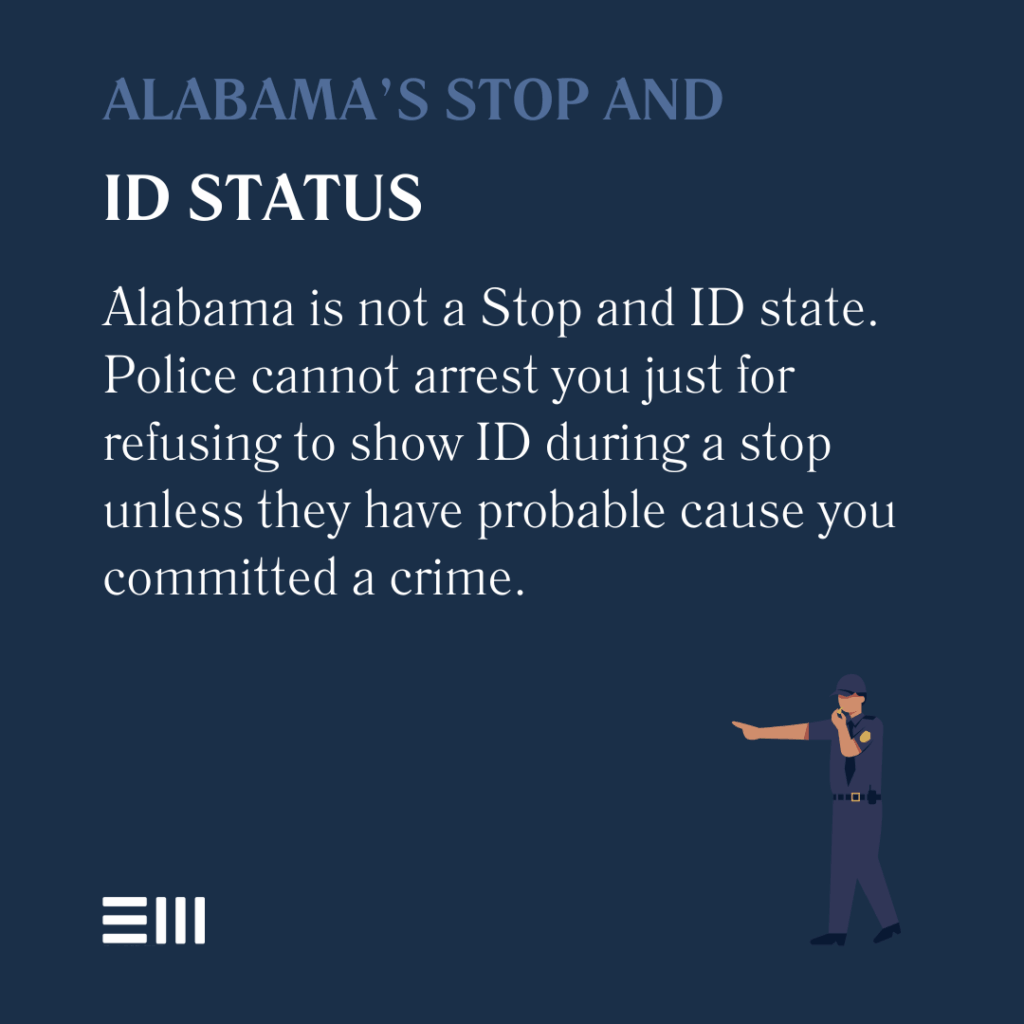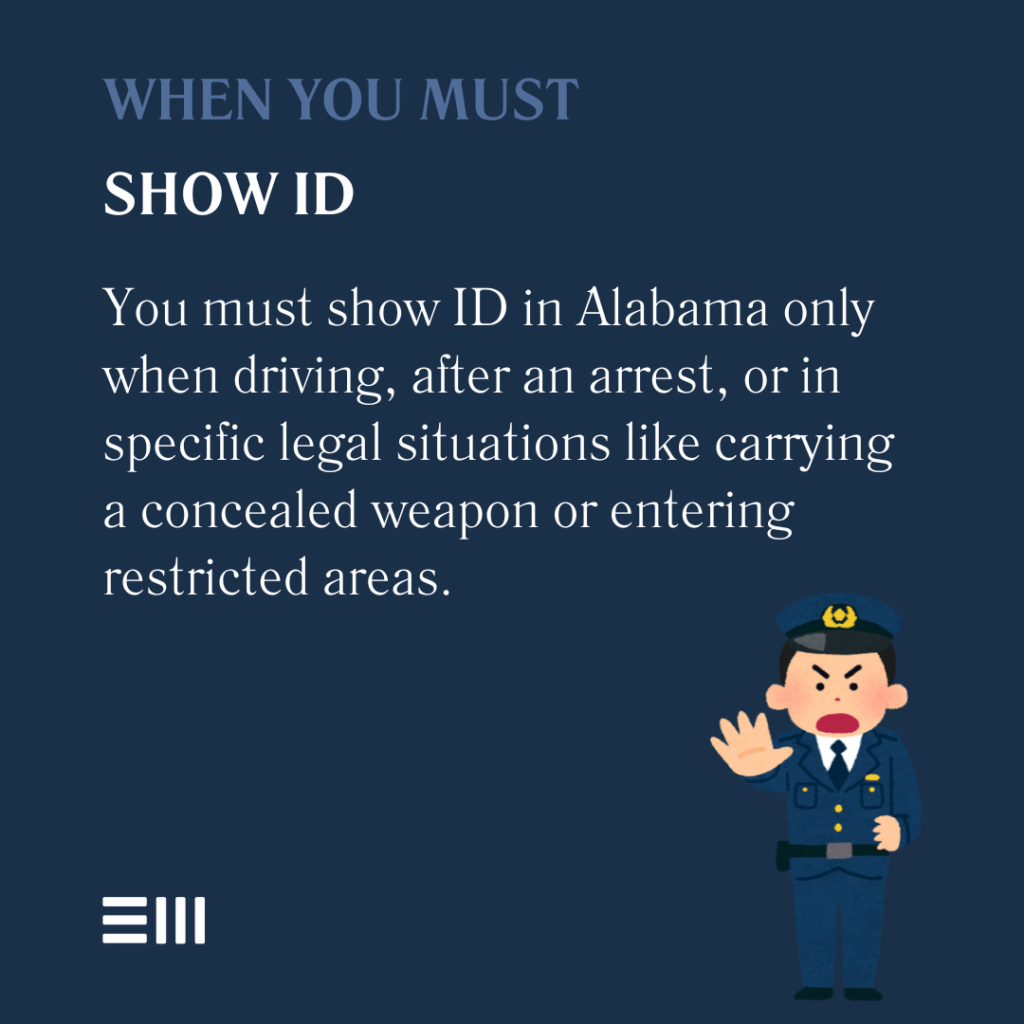
A routine evening walk turns tense when blue lights flash behind you and an officer approaches, demanding identification—but do you legally have to comply?
The answer depends on where you stand, both geographically and legally, as states across America maintain vastly different laws about mandatory identification.
Is Alabama a Stop and ID state? Understanding this distinction could mean the difference between a peaceful encounter and an unlawful arrest, making knowledge of your rights under Alabama law more valuable than ever.
Understanding Stop and ID Laws
Stop and ID laws represent a specific category of state legislation that requires individuals to identify themselves to law enforcement officers under certain circumstances. These laws create a legal obligation to provide identification when police have reasonable suspicion of criminal activity.
Currently, 24 states have enacted Stop and ID statutes, each with varying requirements and penalties.
These laws emerged from the Supreme Court’s 1968 decision in Terry v. Ohio, which established that police could briefly detain individuals based on reasonable suspicion.
However, the Court later clarified in Hiibel v. Sixth Judicial District Court of Nevada (2004) that states could require identification during such stops without violating the Fourth or Fifth Amendments.
The distinction between Stop and ID states and non-Stop and ID states fundamentally affects citizen-police interactions.
In Stop and ID states, refusing to identify yourself during a lawful detention can result in arrest and criminal charges, while in other states, silence remains protected unless you’re under arrest.
Alabama’s Position on Stop and ID
Alabama stands firmly among the states that have not adopted Stop and ID legislation, meaning residents enjoy broader protections regarding identification requirements during police encounters.
This legal stance reflects Alabama’s approach to balancing law enforcement needs with individual privacy rights.
Under Alabama law, police officers cannot arrest someone solely for refusing to provide identification during a Terry stop.
Officers must have probable cause to believe you’ve committed a crime before requiring identification. This distinction proves critical during street encounters, where officers may request but cannot demand identification without additional justification.
Alabama Code does not contain provisions criminalizing the refusal to identify oneself to police during investigative detentions.
The absence of Stop and ID laws in Alabama means that constitutional protections against self-incrimination remain robust during police encounters. Citizens can lawfully decline to provide identifying information unless they’re operating a motor vehicle or under formal arrest.

When You Must Provide ID in Alabama
Despite Alabama not being a Stop and ID state, specific situations legally require individuals to provide identification to law enforcement.
Understanding these exceptions helps citizens navigate police encounters while remaining compliant with applicable laws.
- During traffic stops when operating a motor vehicle on public roads.
- After formal arrest for booking and processing procedures.
- When carrying concealed weapons with a permit upon officer request.
- At sobriety checkpoints established according to legal guidelines.
- When entering federal buildings or restricted government facilities.
- During commercial vehicle inspections if operating commercially.
These mandatory identification scenarios stem from specific statutory requirements rather than general Stop and ID principles.
Failing to provide identification in these circumstances can result in additional charges or complications to your legal situation.

Your Rights During Police Encounters
Knowing your rights during police encounters in Alabama empowers you to protect yourself legally while maintaining respectful interaction with law enforcement. The absence of Stop and ID laws provides Alabama residents with significant protections.
You retain the right to remain silent beyond providing the required information in specific circumstances. This includes declining to answer questions about where you’re going, what you’re doing, or other investigative inquiries.
You may ask whether you’re free to leave, and if the officer confirms you’re not under arrest or detention, you can walk away. Recording police encounters remains legal in Alabama, provided you don’t interfere with officer duties.
These rights exist alongside your obligation to avoid obstructing justice or providing false information when you do choose to speak.
Understanding the balance between exercising rights and avoiding unnecessary escalation serves your best interests during any law enforcement interaction.
If a police encounter results in injury or violation of your rights, you may have a personal injury claim.
Consequences of Refusing to Show ID
Since Alabama isn’t a Stop and ID state, refusing to provide identification during a consensual encounter or Terry stop cannot form the sole basis for arrest. However, this refusal may influence how police encounters develop and what additional scrutiny you might face.
Officers may extend the duration of investigative stops when individuals refuse identification, seeking additional evidence to establish probable cause.
Your refusal might prompt more detailed questioning or investigation into the circumstances that led to the initial contact. While refusal itself isn’t criminal in Alabama, any false information provided instead of silence can result in charges for providing false information to law enforcement.
The practical consequences of refusing identification often depend on the specific circumstances and the officer’s response.
Understanding that legal rights and practical outcomes sometimes diverge helps individuals make informed decisions during police encounters.
If you need criminal defense assistance, our attorney referral network can connect you with qualified lawyers.
Best Practices for Law Enforcement Interactions
Successfully navigating police encounters requires balancing the exercise of constitutional rights with practical safety considerations.
These strategies help protect both your legal interests and personal wellbeing during interactions with law enforcement.
- Remain calm and speak respectfully throughout the encounter.
- Clearly state your intention to exercise constitutional rights.
- Avoid sudden movements that might escalate the situation.
- Document the encounter through recording if safely possible.
- Request clarification about whether you’re detained or free to leave.
- Remember officer badge numbers and patrol car information.
These practices help create a record of the encounter while minimizing the risk of escalation. Maintaining composure and clarity during police interactions protects your interests regardless of the encounter’s outcome.
Frequently Asked Questions About Stop and ID Laws in Alabama
Common questions about Stop and ID laws in Alabama help clarify the practical implications of these legal principles for everyday situations.
Can Police Arrest Me for Not Showing ID During a Traffic Stop?
Yes, Alabama law requires drivers to present a valid driver’s license upon request during traffic stops. Failing to provide a license while operating a motor vehicle constitutes a separate offense that can result in arrest, regardless of Stop and ID laws.
This requirement becomes particularly important in serious traffic incidents, including those that could lead to vehicular manslaughter charges.
What Should I Say if Police Ask for ID When I’m Walking?
You may politely ask if you’re being detained or are free to go. If not detained, you can decline to provide identification and leave. If detained, you may exercise your right to remain silent while avoiding any false statements.
Does Refusing ID Make Me Look Guilty?
Exercising constitutional rights cannot legally establish guilt or reasonable suspicion. However, officers may view refusal with suspicion, potentially leading to extended encounters or additional investigation within legal bounds.
Can Police Search Me if I Don’t Provide ID?
Refusing identification alone doesn’t authorize searches. Police need separate legal justification such as probable cause, consent, or specific safety concerns to conduct searches, regardless of whether you provide identification.
Can't find what you're looking for? Search our site below.










